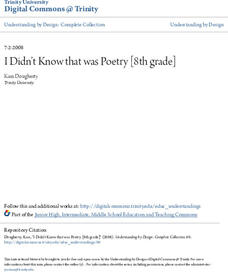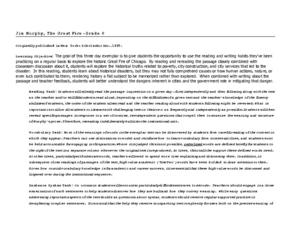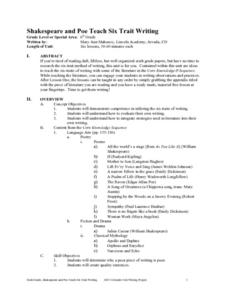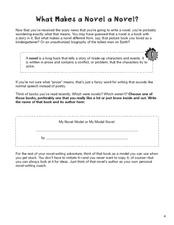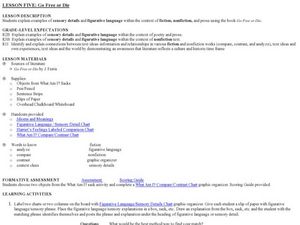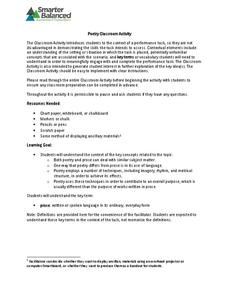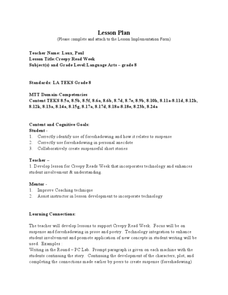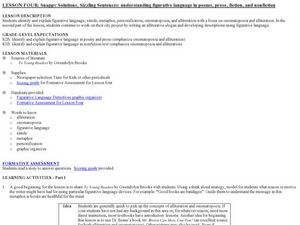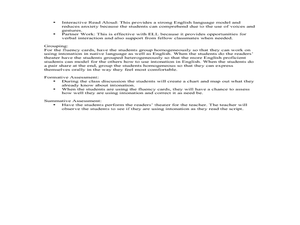Trinity University
I Didn’t Know that was Poetry
Poetry or prose? That is the question facing middle schoolers as they begin a month-long poetry unit by examining the characteristics that differentiate poetry and prose writing. Pupils learn about poetic devices and different types of...
Shakespeare Globe Trust
Twelfth Night
Whether you choose to include Twelfth Night in your course or whether Shakespeare's comedy has been thrust upon you, be not afraid to incorporate an interactive resource into your study of Shakespeare's tale of loss, love, and identity....
Student Achievement Partners
"The Glorious Whitewasher" from The Adventures of Tom Sawyer by Mark Twain with Mini-Assessment
It's the classic scene: Tom Sawyer is whitewashing a fence. Expose your learners to Mark Twain's humor while reinforcing reading comprehension. Eighth graders are encouraged to read and reread, achieving as much exposure to the text as...
Curated OER
Jim Murphy, The Great Fire - Grade 6
The Great Fire by Jim Murphy provides the text for a study of the Chicago fire of 1871. The plan is designed as a close reading activity so that all learners have the same background information require for writing. Richly detailed, the...
Curated OER
Shakespeare and Poe Teach Six-Trait Writing
A Six-Trait Writing instructional activity helps your middle schoolers liven up their word choice and shows them how to evaluate their own writing. Class members take a close look at the language used in poems by Shakespeare, Kipling,...
Curated OER
What Makes a Novel a Novel?
As your authors prepare to write a hypothetical novel, they need all the inspiration they can find! Using a book they have already read (and enjoyed), learners complete a literary analysis by filling in eight short-answer questions....
Texas Education Agency (TEA)
Close Reading of Prose: Practice 2 (English II Reading)
The tone is easy to hear but more challenging to detect in written texts. Users of this interactive learn how to closely observe the diction and words writers use to convey their feelings about their subject. They examine passages that...
ReadWriteThink
What is Poetry? Contrasting Poetry and Prose
Introduce middle schoolers to the different strategies used when reading prose versus poetry. Groups use a Venn diagram and a poetry analysis handout to compare the characteristics of an informational text and a poem on the same subject...
Curated OER
Maniac Magee: Found Poem
Instruct your readers to scrounge through the pages of Maniac Magee in search for descriptive passages or words they may use to write poetry. As they look for meaningful, sensory descriptors in Jerry Spinelli's novel, readers connect to...
K12 Reader
Literature About Chicago: Prose vs. Poetry
In this comprehension exercise, readers compare Carl Sandburg's "Chicago" to a description of the city from Upton's Sinclair's The Jungle.
Curated OER
Go Free or Die: Figurative Language
Figures of speech, sensory details, and academic language are all targeted while reading Chapter Two of J. Ferris’ Go Free or Die. First, learners engage in an exercise to practice describing with detail. Then, partners use a chart to...
Curated OER
When I Set My Hat at a Certain Angle: Trying on Zora Neale Hurston's Voice to Dress-up Prose
After reading and evaluating examples of prose nonfiction by Zora Neale Hurston and other authors, high schoolers write a personal reflective essay rich in figurative language. By incorporating this strategy, they utilize voice within...
Curated OER
Reading Fluency
Aid readers in achieving fluency! Hone in on appropriate pacing, accurate pronunciation, and varied intonation through modeling and ample practice. In one-minute bursts, individuals rehearse reading a passage aloud, recording where they...
Curated OER
Literature: What is it?
Eleven slides answer the question "What is literature?" with simple definitions and categories. Each genre of literature is briefly explained and split into subcategories. These bright, colorful slides work well to introduce literature...
Office of Migrant Education
Poetry: Form, Syllables, Mood, and Tone
Looking for a resource to introduce homeschoolers and other out-of-class learners to the elements of poetry? Check out this packet that defines and illustrates important poetry terms.
Smarter Balanced
Poetry
How does poetry differ from other forms of writing? Class members view two writing samples, decide which one is a poem, and then identify the criteria they used to distinguish between the two samples.
Curated OER
Creepy Read Week
Here's a clever technology twist to writing in the round. Participants rotate through a series of computers adding to stories and editing by keystroke and mouse click. "Locked" forms prevent the loss of stories filled with suspense and...
Curated OER
Snappy Solutions, Sizzling Sentences
An examination of the figurative language in Gwendolyn Brooks’ To Young Readers challenges your writers to think about the richness of language. Ask your class why Brooks says, “Good books are bandages.” This discussion of alliteration,...
Curated OER
Reading (Fluency)
Emerging readers practice reading fluency. First, they listen to the teacher and classmates model fluent reading, and then they practice fluent oral reading with a partner. To close the day, they participate in a Reader's Theatre based...
Curated OER
Race into Fluency!
Elementary learners practice reading short passages to increase their fluency. They work in pairs to do repeated readings of Jane and Babe, recording their times. They switch roles and time one another in an effort to decrease the amount...
Curated OER
Imagine That! Analyzing Imagery
Poems by O. Henry, Marion Dane Bauer, Monty Roberts, and Langston Hughes provide the text for a study of symbolism, hyperbole, and imagery. Employing the “think-pair-share” strategy learners generate definitions of these terms and locate...
Curated OER
Irony in Poetry and Prose (Fiction and Non-fiction Texts)
Middle and high schoolers examine the impact of irony in poetry and prose. In this figurative language lesson, they read instructor-selected literature and identify uses of irony. Then they discuss how irony enhances literature.
Curated OER
What's that Mammal?
Learning by example is always effective if it's paired with independent practice opportunities! Model good reading practices for your class. Learners listen to the teacher model examples of reading with voice, expression, and tone...
Curated OER
Give Me Some Expression!
Work to improve oral expression while reading aloud. Young scholars read sentence strips, changing their volume, speed, and tone to match what is written, making the sentence more meaningful. They read an entire story with a partner who...


